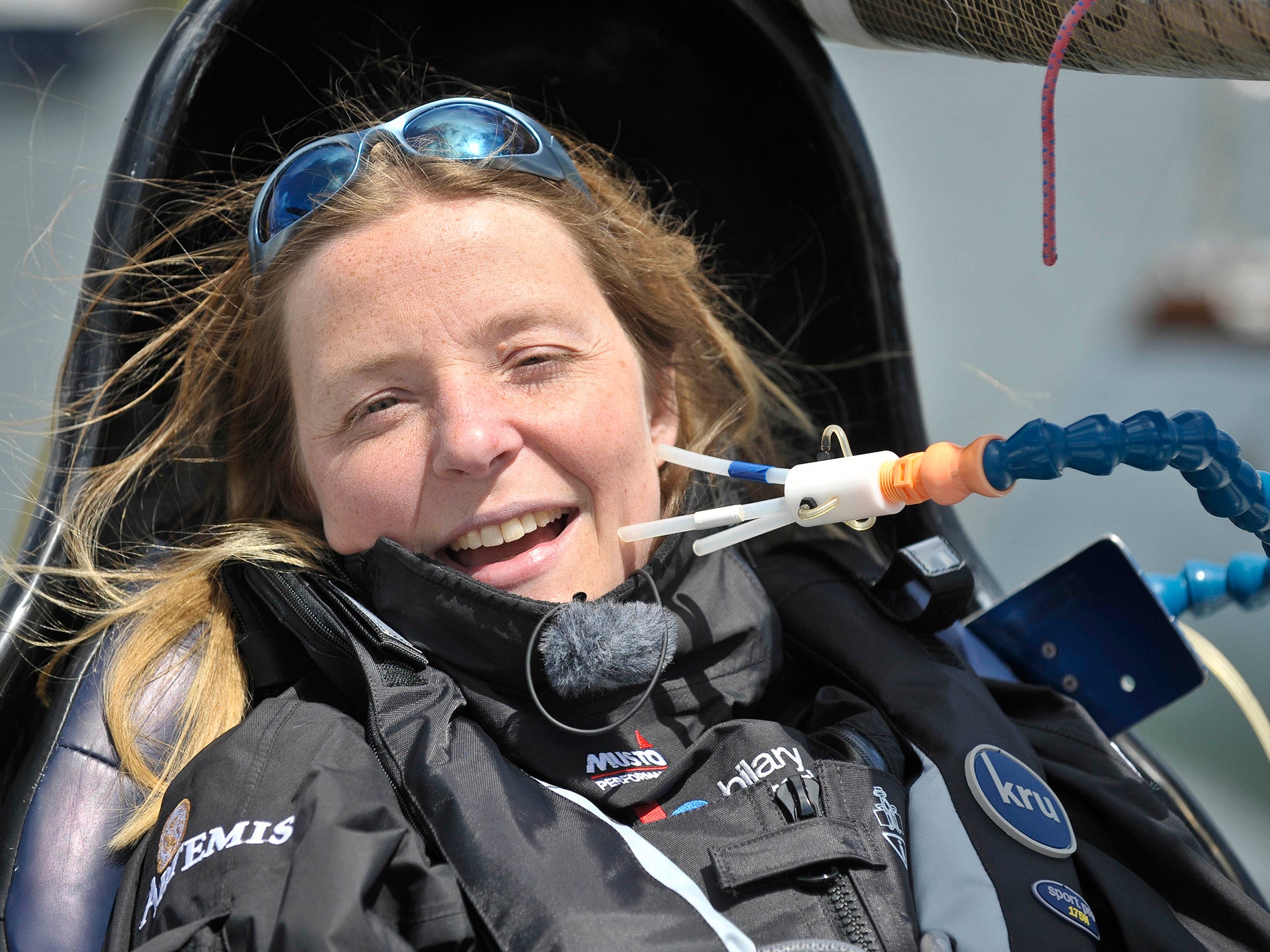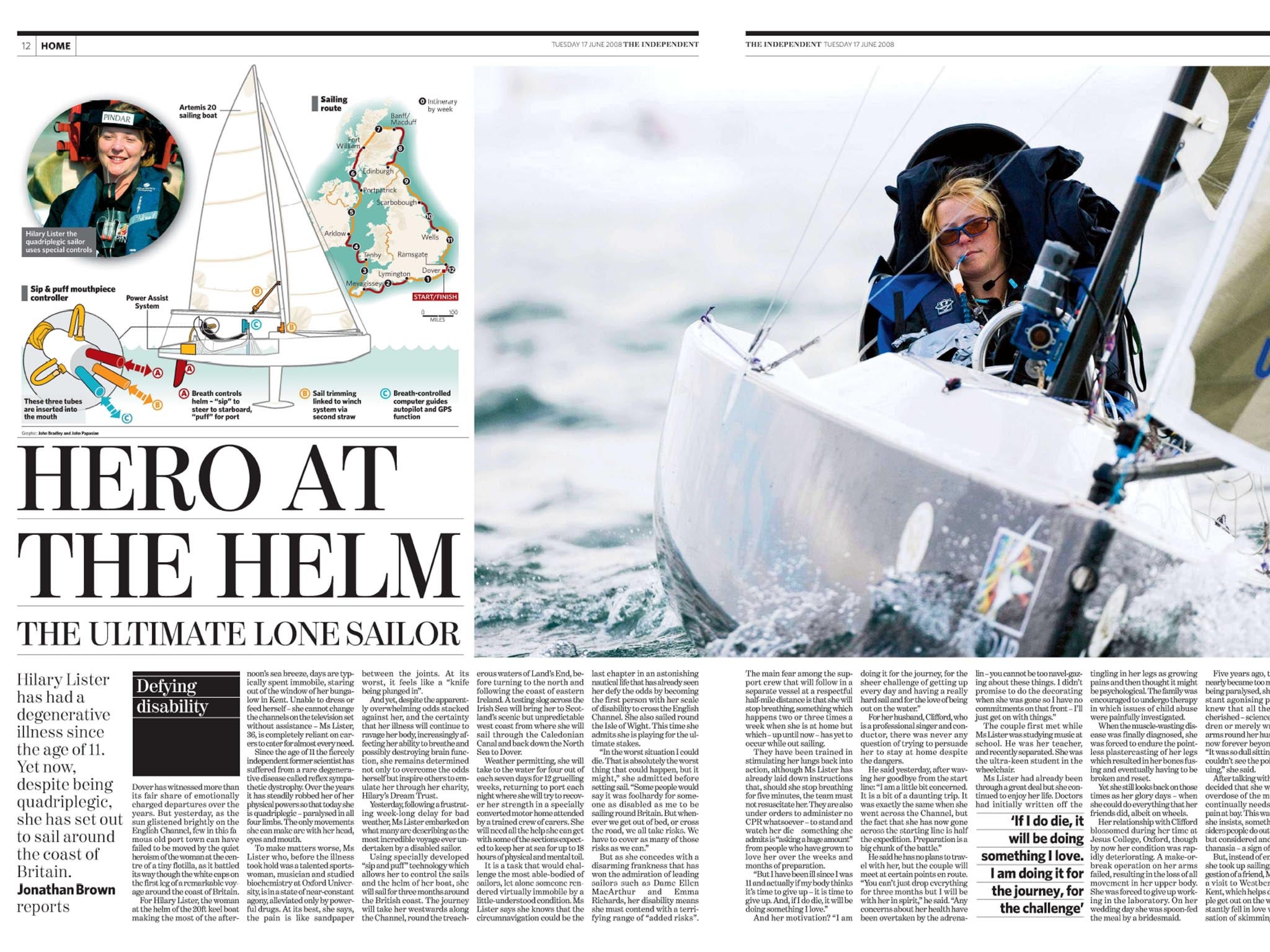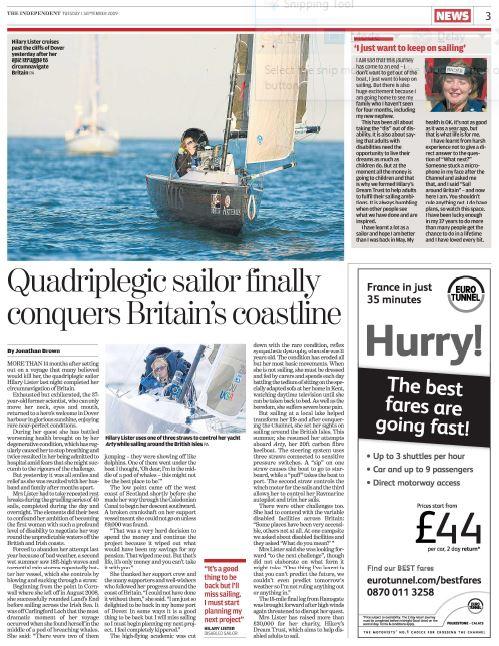Hilary Lister: Record-breaking sailor who made a splash in newspapers as she defied disability
She risked her life and inspired awe as she refused to allow being quadriplegic to deny her the chance to chart the oceans

“Dying is a possibility,” Hilary Lister told The Independent in 2009. “It is not unlikely. I have a degenerative disease, so at some point I will stop breathing. The whole of my family think it would be great if I was on the water when it happened.”
The record-breaking sailor, who has died aged 46, did not allow being paralysed from the neck down to prevent her from achieving her dreams.
That year, after being forced to abort an attempt to circumnavigate the British Isles, she said: “Life carried on in a quite bizarre way because you have come back from this incredible experience and suddenly you are stuck back on the sofa again.”
She added: “If I am at home I get put on the sofa by one carer at 9am and taken off by another carer at 7pm and put to bed.”
Lister was born Hilary Rudd in Oxfordshire in the early 1970s. Her father was a vicar and her mother a professor of biochemistry at Oxford University. She grew up in Dunkirk near Canterbury and described her childhood self as a tomboy, enjoying rugby, hockey, swimming and canoeing. Until the age of 11 Lister was able-bodied, putting down the discomfort in her legs to growing pains. However when she was 15, reflex sympathetic dystrophy, a rare degenerative disease, started to rob Lister of the use of her limbs.
By the time she won a place at Oxford, to study biochemistry, she was using a wheelchair.
On graduating, and newly married to her husband Clifford, she went on to the University of Kent to work on a PhD. However, she soon lost the use of her arms, too, and was unable to complete her studies.

A keen clarinettist – her husband was once her music teacher – Lister taught clarinet for a while, but by the time she was 27, she was paralysed from the neck down. She told CNN: “I couldn’t wash or feed myself or do any of the basic things in life. I was in very bad place where I was assessing the quality of my life and wondering whether it was worth continuing.”
Three years later, Lister was introduced to sailing, when a friend took her to Westbere Sailing Opportunities which is part of the FYA Sailability programme which empowers disabled sea-aventurers. “Within a minute of getting in a boat, I was hooked,” Lister told a local newspaper. “Before that I had pretty much resigned myself to dying quietly in a corner somewhere.”
But it wasn’t enough for Lister to be a passenger. She was soon frustrated at not being able to control a boat herself. Having met record-breaking sailor Emma Richards, the youngest person to complete the Around Alone round-the-world yacht race, Lister set her sights on what seemed like an impossible dream. She became determined to sail the English Channel solo.
Lister was already using a wheelchair with “sip and puff” technology, through which a power-assisted system is controlled via straws that trigger pressure sensitive switches. She tracked down a boat fitted with the same technology through the Disabled Sailing Association and began training in the Solent. However the borrowed boat wasn’t big enough for the cross-Channel sail.
Help came in the form of sailing charity UKSA and sponsorship from businessman Andrew Pindar, to whom Lister was introduced by Richards. With their backing, Lister was able to have a larger boat kitted out by Matt Debicki of The Inventure Trust, who used parts from some of Lister’s old wheelchairs to make the new boat’s “sip-puff” system. Lister christened her boat Malin, which means “little fighter” in Anglo Saxon.

Just two years after she first took to the water, Lister sailed the English Channel alone, setting the record for the world’s longest solo sail for a quadriplegic. She made the crossing on 23 August 2005, followed at a distance by a support crew, in just six hours and 13 minutes. “I was absolutely certain that once I got in the boat I could make it to France,” she said.
Lister subsequently won the Sunday Times Helen Rollason Award for Inspiration and quickly followed her record-breaking achievement by becoming the first female quadriplegic to sail solo around the Isle of Wight in 2007. That same year she was awarded an honorary degree by her alma mater, the University of Kent.
Lister’s challenge for 2008 was to sail solo around Britain in a new boat, the Me Too, an Artemis 20. Her first attempt was foiled by technical problems and bad weather but she tried again and succeeded a year later, becoming the first disabled woman to circumnavigate Britain solo on 31 August 2009.
The voyage was captured for television in a BBC2 documentary, Voyage Against Time. It was a year in which Lister was showered with awards, including the Cosmopolitan Superhero Award.
Keen to build on her success, in 2010 Lister sailed around Bahrain in support of Bahrain Mobility International and mooted a plan to circumnavigate the world. She continued to work as a Pindar ambassador, taking part in extreme sailing events with the GAC Pindar team.
Determined that other disabled or disadvantaged adults should also have access to the sailing opportunities that changed her life, Lister set up Hilary’s Dream Trust. She said: “I want to get able-bodied people to rethink their views about the disabled. We do not need wrapping up in cotton wool and can go out and do silly or dangerous things if that’s what we want to do.”
After sailing around Britain’s coastline in 2009, she told The Independent: “I have been lucky in my 37 years to do more than many people get the chance to do in a lifetime. And I have loved every bit.” She added: “I am sad this journey has come to an end – I don’t want to get out of the boat. I just want to keep sailing.”
Hilary Lister, sailor, born 3 March 1972, died 18 August 2018
Join our commenting forum
Join thought-provoking conversations, follow other Independent readers and see their replies
Comments
Bookmark popover
Removed from bookmarks